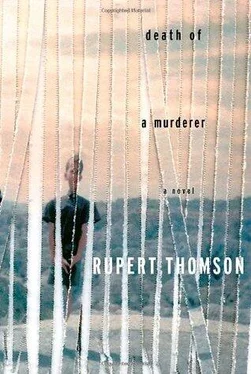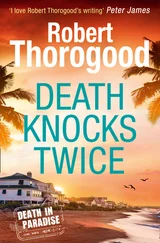Just before Neil hung up, the voices and the shooting came back, even louder than before.
Billy put his mobile away and started walking. In the distance he could hear a siren. It seemed to be drawing closer, and then, quite suddenly, it faded. The wind lifted again. Leaves shook on their branches. Feeling the cold now, Billy quickened his pace. Hang on in there. Neil had given him the encouragement he needed without even being asked. Friends could do that.
Back in A and E, everything was peaceful, just the low-level droning of the hospital itself, the sense of being inside a vast, benevolent machine. He nodded at Fowler, who was guarding the entrance, then walked on through reception. The cafeteria was closed — a security grille had been lowered over the counter — but there were still plenty of places to sit. He removed his anorak and hung it over the back of a chair, then sat down facing the corridor. Opening his bag, he looked for his sandwiches. To be on the safe side, he had made himself four rounds. He always got hungry on nightshifts. It was the boredom. As he took his first bite, he remembered an evening in Paris when he was seventeen, Raymond handing him one small tomato and a toe-end of stale French bread.
Following the break-in at Weston Point, he had avoided Raymond, and Raymond too had turned his attention elsewhere. For the next three years, Billy only ever saw Raymond from a distance, and always in the company of older boys, but then, inevitably, the chain that seemed to bind them tightened again. A few days after O levels, he was standing outside the school gates when Raymond sauntered over.
“Any plans for the summer, Billy?”
Lighting a cigarette, Raymond tossed the match into the gutter.
“No,” Billy said warily. “Not really.”
He did have plans, though. He was all lined up to work at the animal-feed business his uncle ran. Later, in the autumn, he wanted to take an HGV test. You could make decent money driving lorries. Or he might even apply to the police. His friend, Neil, was thinking of applying too. Their reasons were the usual ones. They thought they might be able to make a difference. Do some good. But these weren’t the kind of things that you could say to somebody like Raymond.
“Why don’t we go travelling,” Raymond said, “in Europe?”
Billy stared at him. “Europe?”
“There’s no need to worry about money,” Raymond said. “I’ve got enough for both of us.”
Billy remembered the fiver Raymond had offered him. It came back so vividly that he could almost feel the stitch he’d had from cycling up the hill without stopping.
“Athens, Venice, Copenhagen.” Raymond’s arms opened wide, as if he might actually conjure one of those great cities out of the air. “Monte Carlo…”
On the last day of July they crossed the Channel by ferry, then caught a train to Paris, and it was there, in a park called Buttes-Chaumont, that Billy began to understand what he had let himself in for. He looked over at Raymond, who was stretched out on his back under a tree. Raymond wore a dark-blue suit with chalk pinstripes — it had once belonged to a drug dealer from Moss Side, or so Raymond claimed — and tipped down over his eyes was the grey fedora he’d found in a flea market the day before. Beside him, on the grass, lay a small leather suitcase with gold catches. Raymond wouldn’t have been seen dead with a rucksack. Rucksacks were for students. Billy had a rucksack, of course. His mother had bought it for him when he told her about the trip. She couldn’t afford to buy him presents, especially now Charlie had gone to medical school, but she had wanted to please him. It’s a good one, Billy. He could still hear her saying that. And yet, in Raymond’s presence, the rucksack was an embarrassment, and he took no care of it. Sometimes, as he threw it on to a hostel floor, or kicked it across a railway station concourse, he imagined his mother watching, and shame would sweep over him. He felt an awful, nameless sadness about the way people treat each other.
“Let’s go and eat, Raymond,” he said.
They’d had nothing since breakfast, and it was already early evening.
Raymond pushed the brim of his hat up with one finger. “Did you say something?”
“What are we going to eat tonight?”
“I bought a couple of tomatoes,” Raymond said, “and there’s half a baguette left over from yesterday. That should do us.”
So that was supper.
Afterwards, Raymond declared himself quite full—“replete” was the word he used — and Billy couldn’t bring himself to disagree.
Over the next few days, as they journeyed south, Raymond subjected Billy to a series of lectures on food. It was his belief that food both dulled perception and extinguished desire. Raising his voice above the clatter of the train, he recited lines from Baudelaire, then he talked about how Jean Genet had written most of his books while hungry. He quoted a letter in which William Burroughs describes finding an inch of fat on his stomach and being repulsed by it. He quoted some Chinese poets as well. The only image Billy could remember later was that of an old man surviving on the leaves that fall from a locust tree. He hoped to God there were no locust trees in Monte Carlo. Food breeds laziness, Raymond said. It breeds complacency. Food’s dangerous. If the trip they were making was to be worthwhile, if they wanted to see things, really see things, they should be careful not to eat too much.
“Dangerous?” Billy said in a quiet voice. “Food?”
“Oh yes,” Raymond said. “The danger cannot be overestimated.”
Billy watched a field of vivid lavender float by. “So we have to starve?”
“Think of Rimbaud in Ethiopia,” Raymond said. “Think of St. Francis in that cave outside Assisi.”
In part, Billy brought it on himself, since he deferred to Raymond constantly. It was Raymond who decided where they stayed — doss-houses every time, for their “atmosphere”—and it was Raymond who came up with the itinerary. But then the whole trip had been Raymond’s idea in the first place, so what was Billy to do? Although he did have a little money of his own, he felt awkward using it — and besides, it wouldn’t have been enough to make a real difference. He was dependent on Raymond, in more ways than one, and Raymond knew it.
In a spirit of defiance, Billy walked over to the snack bar’s vending-machines and bought a packet of crisps and an orange Fanta. He imagined Raymond’s lip curling at this display of weakness. The conversations in the park and on the train had happened at the beginning of their holiday, and it wasn’t until the last night that Billy finally rebelled. It was late afternoon when they arrived in Ostend, and the ferry didn’t leave until eleven. Billy had already imagined a farewell dinner — nothing fancy, just some fried fish and a bottle of local wine — but Raymond had other ideas. He thought they should eat on the boat, or else wait till morning.
Before Raymond could finish outlining his plan for the evening, Billy interrupted. “I need a bit of money.”
Raymond gave him a look that was both baffled and sly, and then took a step backwards. It was possible that he had known Billy would react in this way; in fact, maybe this was the effect he’d been after.
“Please give me some money, Raymond,” Billy said. “I’m starving.”
Before Raymond could walk away, Billy reached out and grabbed him by the collar. As Raymond tried to jerk himself free, his suit jacket split right down the back. Letting out a string of swearwords, he hit Billy on the side of the head with the back of his hand. Billy felt a flicker of triumph: Raymond so rarely lost control. He still needed money, though. As they wrestled on the quay, Raymond’s ankle turned on the cobbles, and he fell over. One knee on Raymond’s chest, Billy pinned him to the ground. Raymond stopped struggling and closed his eyes. Billy found Raymond’s wallet and removed a few notes, then stood up quickly and dropped the wallet next to Raymond’s outstretched hand.
Читать дальше












